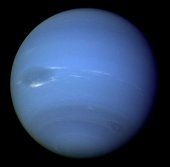
Worksheets and No Prep Teaching Resources
Reading Comprehension Worksheets
Solar System

Solar System
 Worksheets and No Prep Teaching Resources Reading Comprehension Worksheets Solar System |
 Solar System |
| edHelper's suggested reading level: | grades 3 to 5 | |
| Flesch-Kincaid grade level: | 3.5 |
|
Neptune
By Cindy Grigg |

|
 1 Neptune is the eighth and last real planet in our solar system. It is 2 billion, 795 million miles from the sun. That's about thirty times Earth's distance from the sun. It is the fourth-largest planet. It is the smallest of the gas giant planets, but it is about four times larger than Earth. Its gravity is greater than Earth's gravity. If you weigh 100 pounds on Earth, you would weigh 110 pounds on Neptune.
1 Neptune is the eighth and last real planet in our solar system. It is 2 billion, 795 million miles from the sun. That's about thirty times Earth's distance from the sun. It is the fourth-largest planet. It is the smallest of the gas giant planets, but it is about four times larger than Earth. Its gravity is greater than Earth's gravity. If you weigh 100 pounds on Earth, you would weigh 110 pounds on Neptune. |
Create Weekly Reading Books
Prepare for an entire week at once! |
| Leave your feedback on Neptune (use this link if you found an error in the story) |
 |
Solar System
|
 |
Science
|